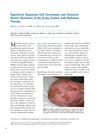 14 citations,
November 2008 in “Expert opinion on drug metabolism & toxicology”
14 citations,
November 2008 in “Expert opinion on drug metabolism & toxicology” Finasteride helps treat prostate issues and may prevent prostate cancer in high-risk men.
 14 citations,
August 1997 in “The Journal of Urology”
14 citations,
August 1997 in “The Journal of Urology” Finasteride can cause enlarged breasts.
 12 citations,
December 2018 in “Clinical Ophthalmology”
12 citations,
December 2018 in “Clinical Ophthalmology” Latanoprostene bunod effectively lowers eye pressure and is better tolerated than other glaucoma medications.
 12 citations,
December 2012 in “Current Drug Targets”
12 citations,
December 2012 in “Current Drug Targets” The Androgen Receptor could be a target for treating diseases like cancer, but more research is needed to confirm the effectiveness of potential treatments.
 11 citations,
June 2012 in “Human Reproduction Update”
11 citations,
June 2012 in “Human Reproduction Update” The conclusion is that there is a high demand for new contraceptives that provide both pregnancy prevention and protection against STIs, along with additional health benefits.
 10 citations,
May 2018 in “Nutrition and Cancer”
10 citations,
May 2018 in “Nutrition and Cancer” Certain spices may help prevent and treat skin cancer, but more human trials are needed.
 10 citations,
May 2018 in “Neuropharmacology”
10 citations,
May 2018 in “Neuropharmacology” Drugs for hormone-related conditions might help treat mental disorders but could have serious side effects.
 10 citations,
February 2009 in “European urology. Supplement”
10 citations,
February 2009 in “European urology. Supplement” Treatment for benign prostatic hyperplasia involves drugs that either quickly relieve symptoms or reduce prostate size, with a combination offering more benefits but more side effects.
 9 citations,
March 2011 in “Current Pharmaceutical Biotechnology”
9 citations,
March 2011 in “Current Pharmaceutical Biotechnology” Stem cell therapies show promise for treating various diseases but face challenges in clinical use and require better monitoring techniques.
 8 citations,
July 2018 in “Current Sexual Health Reports”
8 citations,
July 2018 in “Current Sexual Health Reports” Finasteride can cause lasting sexual dysfunction, depression, and other side effects, needing more research for treatment.
 8 citations,
October 2017 in “Dermatologic Surgery”
8 citations,
October 2017 in “Dermatologic Surgery” Men need higher doses and tailored injection techniques for botulinum toxin treatments due to their unique facial features.
 7 citations,
January 1994 in “Annual Reports in Medicinal Chemistry”
7 citations,
January 1994 in “Annual Reports in Medicinal Chemistry” Understanding how androgens work is key for creating new treatments for prostate issues and hair/skin conditions.
 5 citations,
May 2006 in “Dermatologic Surgery”
5 citations,
May 2006 in “Dermatologic Surgery” Radiation therapy successfully treated an elderly man's skin cancer and pre-cancerous scalp lesions.
 4 citations,
November 2023 in “Frontiers in immunology”
4 citations,
November 2023 in “Frontiers in immunology” New treatments targeting T-cell pathways are needed for better alopecia areata management.
 4 citations,
November 2020 in “Psoriasis : Targets and Therapy”
4 citations,
November 2020 in “Psoriasis : Targets and Therapy” The document concludes that proper treatment and management of plaque psoriasis in adolescents can improve their quality of life.
 4 citations,
May 2018 in “Journal of Neuro-Ophthalmology”
4 citations,
May 2018 in “Journal of Neuro-Ophthalmology” New treatments for relapsing multiple sclerosis are more effective and convenient but have higher risks of serious side effects.
 3 citations,
November 1999 in “Journal of Cutaneous Medicine and Surgery”
3 citations,
November 1999 in “Journal of Cutaneous Medicine and Surgery” AGA is a genetic, hormonal hair loss treated with finasteride, minoxidil, and supplements, but new compounds are being developed.
 2 citations,
April 2019 in “Dermatologic Therapy”
2 citations,
April 2019 in “Dermatologic Therapy” A patient with alopecia had hair regrowth with tofacitinib but developed a skin reaction, choosing to continue the treatment despite the side effect.
 2 citations,
October 2018 in “Springer eBooks”
2 citations,
October 2018 in “Springer eBooks” Cancer treatments can cause skin-related side effects that may affect patient quality of life and require changes in treatment.
 2 citations,
November 2017 in “Elsevier eBooks”
2 citations,
November 2017 in “Elsevier eBooks” Different substances that activate or block the androgen receptor can affect male development and treat conditions like prostate cancer.
 2 citations,
January 2016 in “Springer eBooks”
2 citations,
January 2016 in “Springer eBooks” Fat tissue stem cells show promise for repairing different body tissues and are being tested in clinical trials.
 2 citations,
January 2014 in “Springer eBooks”
2 citations,
January 2014 in “Springer eBooks” The book details skin conditions in older adults, their link to mental health, cancer treatment importance, hair loss remedies, and managing autoimmune and itchy skin.
 2 citations,
September 2012 in “Actas Dermo-Sifiliográficas”
2 citations,
September 2012 in “Actas Dermo-Sifiliográficas” Societal pressure for the perfect body leads to health risks and disorders.
 1 citations,
January 2024 in “Curēus”
1 citations,
January 2024 in “Curēus” Upadacitinib significantly improved a man's severe scalp condition when other treatments failed.
 1 citations,
October 2023 in “Dermatology and therapy”
1 citations,
October 2023 in “Dermatology and therapy” Some treatments for severe hair loss work but often have side effects, with baricitinib showing the most promise.
 1 citations,
January 2023 in “Przegląd Dermatologiczny”
1 citations,
January 2023 in “Przegląd Dermatologiczny” The Polish Society of Dermatology recommends treatments for alopecia areata that vary by severity, including topical and systemic medications, with long-term maintenance important for management.
 1 citations,
June 2021 in “Journal of dermatology and dermatitis”
1 citations,
June 2021 in “Journal of dermatology and dermatitis” Tyrosine kinase inhibitors show promise in treating some skin diseases but their definitive role in dermatology is still unclear.
 1 citations,
March 2019 in “Actas Dermo-Sifiliográficas”
1 citations,
March 2019 in “Actas Dermo-Sifiliográficas” New cancer treatments are less harmful to hair but can still cause hair loss, color, shape, and growth changes.
 1 citations,
October 2018 in “InTech eBooks”
1 citations,
October 2018 in “InTech eBooks” Only minoxidil and finasteride are FDA-approved for hair loss, with other treatments available but less effective or with side effects.
 1 citations,
April 2018 in “Revista da Sociedade Portuguesa de Dermatologia e Venereologia”
1 citations,
April 2018 in “Revista da Sociedade Portuguesa de Dermatologia e Venereologia” Hidradenitis suppurativa is a chronic skin condition more common in women, linked to genetics and lifestyle factors, and associated with various other health issues.






























